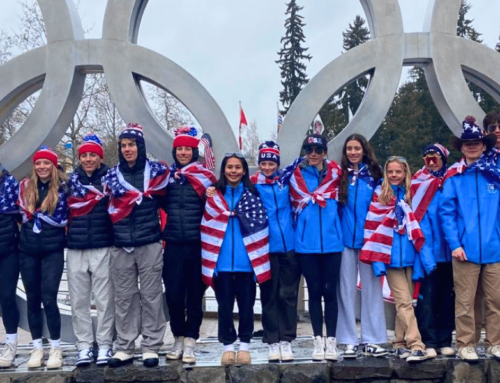DU, CU set to host first NCAA races of season
For the first time since March, seven colleges will join together for four days of elite domestic racing across two venues. The NCAA circuit will kick off the season this Sunday in Aspen, Colo., with the University of Denver (DU) Invitational, followed by the University of Colorado (CU) Invitational at Eldora in Nederland, Colo.
DU will open the 2021 college racing circuit by hosting two days of doubleheader GS races in Aspen. Seventy-five women and 75 men representing teams from DU, CU, University of Utah, Montana State, Alaska Anchorage, Westminster, and Colorado Mountain College (CMC) will travel to Pitkin County this weekend for the first half of the college racing season. A number of other college athletes not officially representing an active team are expected to be on the start list as well — athletes from college teams that have opted out for the year, such as Middlebury and Dartmouth.
“I am super excited to begin the college circuit once again from where we left off last year at NCAA championships,” said Andy LeRoy, head coach of the DU alpine team. “I think we learned a lot over the last eight to 10 months. I think watching the U.S. Nationals in our backyard at Copper with all their safety and protocols gave us the confidence that we could proceed at the college level and imitate the same type of intricacies they ran the race with. Hopefully we will be successful and make this the first of the entire season for the NCAA season.”
In order to mitigate COVID-19 spread and adhere to new protocols and guidelines across multiple states and counties, doubleheader days should be expected as the new norm. One of those guidelines is limiting the amount of athletes that are allowed to access the hill per day, a guideline that changes per state and county. Instead of having an entire college team on the hill and running a traditional race, the college teams have decided to replicate the U.S. Nationals format from earlier this year, hosting two races on the same day, which allows the athletes to get the most bang for their buck when only limited number athletes are allowed at once.
The events themselves have also changed for the year. In years past, the DU Invitational has consisted of one slalom and one GS. And hosting in Aspen this year requires a number of additional protocols, including a negative COVID-19 test from every individual who travels to Pitkin County 72 hours prior to departure. In discussion with Aspen, it was also decided the number of athletes that would be allowed on the venue, 75. Splitting the genders per day allows 40 college racers to be accompanied by the best FIS racers across the country, bringing more opportunity for competition and fast skiing to a single-gender race day.

Aspen also offers a massive venue to the athletes, giving course setters and spacing for athletes a lot of flexibility. The hill will have two GS courses set side by side, each course representing one race. When the women wake up on Sunday they will submit their negative symptom check before heading to the hill. They will inspect one course, run it through twice, and complete race No. 1. They will then repeat the process on the course they haven’t run yet, and complete a second race for the day. That’s before they head to Eldora to compete in the CU invitational slaloms.
“For this being the first go around and then heading straight to Eldora, we will pursue this format and knock out roughly half of the college season in just four days,” said LeRoy. “In four days, CU will be responsible for two men’s and women’s slaloms and that will be the CU invite, and DU will be responsible for two men’s and women’s GS — that will be the DU invite.”
Traveling to Eldora, located in Boulder county, requires a second negative COVID-19 test 48 hours prior to departure. In conversation with Eldora, it was decided that only 60 athletes will be allowed on the hill each day. CU will sustain the same model of racing as the GS in Aspen, with the women taking the hill first and participating in two slaloms on Tuesday.
“That’s the format we will use for the entire season,” said LeRoy. “When we start looking into the regulations and not just how we can best serve the college circuit, but these ski areas, we can’t host 40 men and 40 women on a given day, that’s just not paying for a race. By adding other people into the race it makes it feasible for the ski areas and it’s also an opportunity for other programs and regions to race.”
In planning these events, LeRoy remained cautiously optimistic throughout the process but wasn’t 100% positive that Aspen and Eldora would give the green light until a few days after the New Year. He was having conversations with the ski area to evaluate if they could still pull off a successful race, and neither could find a reason not to try.

“We are hopeful for what we can do here on the college circuit in Colorado will be really positive and they can do it on the East Coast and they will do it in Utah for our next swing in regionals, and hopefully we will take this all the way through NCAA Championships and NorAm Championships. That could really have an impact on the athletes for the season,” said LeRoy. “There has been a lot of work put in, and it would be nice to see these guys have some opportunities come up at this level that doesn’t seem to exist outside the World Cup right now, at least in this country.”
Like many other colleges in session, athletes at DU have chosen to take advantage of the online school program and train and race abroad with their national teams. Many U.S. and Canadian national team members from DU have been excelling at the World Cup this year while maintaining student status. While his team has shrunk to half the size, his athletes that have chosen to stay local have had tremendous training in Colorado and have welcomed athletes from colleges without formal programs into training sessions.
“Every athlete is plotting their own formula for success, just like they would without COVID,” said LeRoy. “I think everyone is chomping at the bit. It will be pretty interesting to see those who come out of the last eight months and have made some leaps in their life.”
Aspen will host two women’s GS on Jan. 11 followed by two men’s GS the day after. Both genders will travel to Eldora after the men’s race, where the women will race two slaloms Jan. 13 followed by the men on Jan. 14.
LeRoy is hopeful that this model will continue throughout the NCAA season and be a template for other domestic clubs to incorporate into their seasons. His team plans to jump through every obstacle to have a successful season, including a weeklong quarantine that is currently required in the state of New Hampshire, where NCAA Championships are planned to be held. Until then, fingers crossed for a successful round of domestic FIS racing.





















